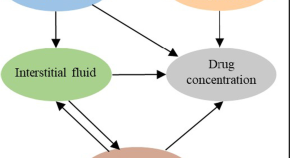Collection
Multiphysics Simulation in Drug Development and Delivery
- Submission status
- Closed
Editors
-
Wenbo Zhan
Wenbo Zhan is a Lecturer in Biological Engineering in the School of Engineering. He received his undergraduate degrees from Xi’an Jiatong University in 2008 and a master degree from Harbin Institute of Technology in 2010. He graduated from Imperial College London with his PhD degree in 2014 and then worked as a project consultant at Imperial College London and a postdoctoral research fellow at the National University of Singapore until 2016. Prior to joining the University of Aberdeen in 2019, he was a research associate at Imperial College London.
-
Chi-Hwa Wang
Dr Chi-Hwa Wang is a Professor of Chemical and Biomolecular Engineering at the National University of Singapore (NUS). He received his B.S. degree (Chemical Engineering) from the National Taiwan University, M.S. degree (Biomedical Engineering) from Johns Hopkins University, M.A. and PhD degrees (both in Chemical Engineering) from Princeton University, respectively. His research interests include drug delivery system and particle technology. Chi-Hwa is the recipient of AIChE Shell Thomas Baron Award 2018, AIChE Fellow 2019, and WSSET Fellow 2020.
Articles (13 in this collection)
-
-
Predictive Design and Analysis of Drug Transport by Multiscale Computational Models Under Uncertainty
Authors (first, second and last of 5)
- Ali Aykut Akalın
- Barış Dedekargınoğlu
- Altug Ozcelikkale
- Content type: Review Article
- Published: 01 June 2022
- Pages: 501 - 523

-
Understanding Formulation and Temperature Effects on Dermal Transport Kinetics by IVPT and Multiphysics Simulation
Authors (first, second and last of 5)
- Paige N. Zambrana
- Peng Hou
- Audra L. Stinchcomb
- Content type: Research Paper
- Published: 16 May 2022
- Pages: 893 - 905

-
Impact of Select Geometric and Operational Parameters on Hydrodynamics in Dissolution Apparatus 2 (Paddle Apparatus): A Design of Experiments Analysis Based on Computational Fluid Dynamics Simulations
Authors (first, second and last of 4)
- Satish Perivilli
- Steven Walfish
- Mark R. Liddell
- Content type: Research Paper
- Open Access
- Published: 16 May 2022
- Pages: 919 - 934

-
Role of Tissue Hydraulic Permeability in Convection-Enhanced Delivery of Nanoparticle-Encapsulated Chemotherapy Drugs to Brain Tumour
Authors
- Yi Yang
- Wenbo Zhan
- Content type: Research Paper
- Open Access
- Published: 26 April 2022
- Pages: 877 - 892

-
Analysis of Magneto-Hyperthermia Duration in Nano-sized Drug Delivery System to Solid Tumors Using Intravascular-Triggered Thermosensitive-Liposome
Authors
- Mohammad Souri
- Farshad Moradi Kashkooli
- M. Soltani
- Content type: Research Article
- Published: 11 April 2022
- Pages: 753 - 765

-
Effect of Particle Size and Surface Charge on Nanoparticles Diffusion in the Brain White Matter
Authors (first, second and last of 4)
- Tian Yuan
- Ling Gao
- Daniele Dini
- Content type: Research Paper
- Open Access
- Published: 21 March 2022
- Pages: 767 - 781

-
Translational Modeling Identifies Synergy between Nanoparticle-Delivered miRNA-22 and Standard-of-Care Drugs in Triple-Negative Breast Cancer
Authors (first, second and last of 12)
- Prashant Dogra
- Javier Ruiz Ramírez
- Zhihui Wang
- Content type: Research Paper
- Open Access
- Published: 16 March 2022
- Pages: 511 - 528

-
Predicting Viable Skin Concentration: Modelling the Subpapillary Plexus
Authors
- Joshua J. Calcutt
- Michael S. Roberts
- Yuri G. Anissimov
- Content type: Research Paper
- Open Access
- Published: 09 March 2022
- Pages: 783 - 793

-
3D Printing Methyl Cellulose Hydrogel Wound Dressings with Parameter Exploration Via Computational Fluid Dynamics Simulation
Authors
- Jia Heng Teoh
- Faheemah Tasneem Abdul Shakoor
- Chi-Hwa Wang
- Content type: Research Paper
- Published: 04 February 2022
- Pages: 281 - 294

-
Multiphysics Modelling and Simulation of Thrombolysis via Activated Platelet-Targeted Nanomedicine
Authors (first, second and last of 7)
- Boram Gu
- Yu Huang
- Xiao Yun Xu
- Content type: Research Paper
- Open Access
- Published: 19 January 2022
- Pages: 41 - 56

-
How Does Fluid Flow Influence Drug Release from Drug Filled Implants?
Authors
- David King
- Christopher McCormick
- Sean McGinty
- Content type: Research Paper
- Open Access
- Published: 07 January 2022
- Pages: 25 - 40

-
Ocular Fluid Mechanics and Drug Delivery: A Review of Mathematical and Computational Models
Authors
- Ajay Bhandari
- Content type: Research Paper
- Published: 22 December 2021
- Pages: 2003 - 2033



